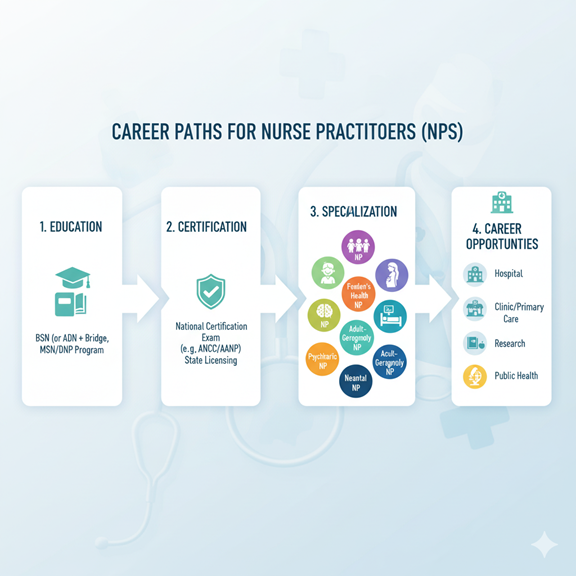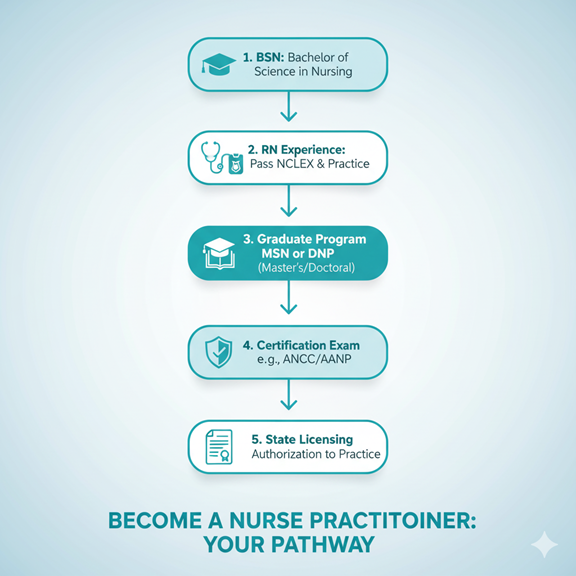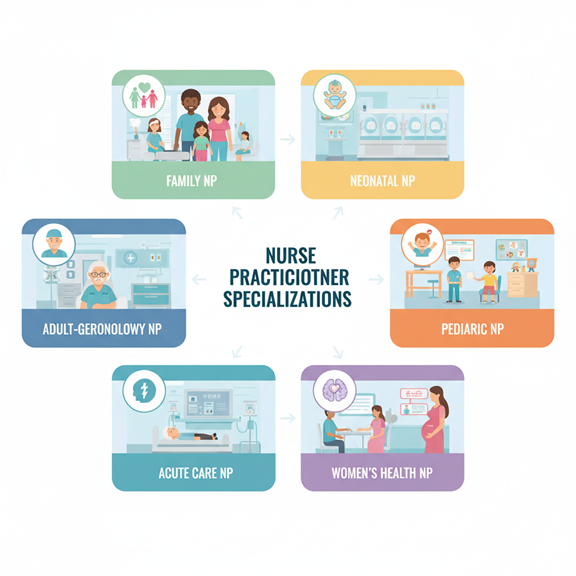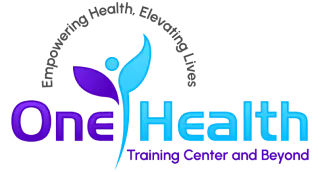Nurse Practitioners (NPs) play a vital role in healthcare, offering a wide range of services to patients of all ages. Becoming an NP opens up numerous career opportunities in different specialties, each contributing uniquely to patient care. Here’s a detailed look at the journey to becoming an NP, the various areas of specialization, and the numerous career opportunities available.
The path to becoming a Nurse Practitioner is structured yet flexible, allowing individuals to pursue advanced education and specialized care for patients. The process involves multiple steps to ensure that NPs are equipped with the necessary skills and knowledge.
To begin, individuals must complete a Bachelor of Science in Nursing (BSN). This foundational degree is required to become a Registered Nurse (RN), allowing individuals to gain practical experience in healthcare settings. Once an individual becomes an RN, the next step is to pursue a graduate-level program in nursing. This could be a Master’s or Doctoral program focused on training NPs in specialized areas of care. These programs offer in-depth knowledge and skills necessary for diagnosing, treating, and...
Upon completing the graduate program, aspiring NPs must take and pass a certification exam. The certification ensures that NPs meet the required professional standards. Following certification, NPs must obtain licensing from their state or region, which grants them the authority to practice as NPs. This licensing process varies by state but is an essential step in the professional journey.


Nurse Practitioners can choose from a wide range of specialties, each focused on different patient populations and care needs. These specializations enable NPs to work in diverse healthcare settings, from hospitals to private practices.
Family Nurse Practitioners are trained to provide care to patients of all ages, including children, adults, and the elderly. They offer comprehensive healthcare services, from preventive care to the management of chronic conditions. FNPs are often the first point of contact for patients and play a significant role in managing their overall health.


This specialization focuses on the care of adults and elderly patients, specifically managing long-term health conditions and promoting healthy aging. AGPCNPs play a crucial role in primary care settings, focusing on health promotion, disease prevention, and management of chronic conditions such as diabetes, hypertension, and arthritis.
AGACNPs provide specialized care to patients with acute and complex health conditions. These NPs typically work in hospital settings, including emergency rooms and intensive care units (ICUs), where they manage critical illnesses, perform diagnostic tests, and provide advanced treatment options.


NNPs specialize in the care of newborns, particularly those born prematurely or with critical health conditions. They work closely with neonatologists to provide care in neonatal intensive care units (NICUs), ensuring the health and survival of infants during their early days of life.
Pediatric Nurse Practitioners provide specialized care to children from birth through adolescence. They are trained to manage common childhood illnesses, perform routine check-ups, and provide vaccinations. PNPs also play a significant role in educating parents on healthy lifestyle choices and disease prevention.


PMHNPs focus on the mental health and emotional well-being of patients. They diagnose and treat mental health disorders such as depression, anxiety, and schizophrenia. Working in clinics, hospitals, and private practices, PMHNPs offer therapy, medication management, and support for individuals coping with mental health challenges.
This specialization focuses on the healthcare needs of women throughout their lifespan, from adolescence to menopause and beyond. WHNPs provide gynecological exams, family planning services, and prenatal and postnatal care. They also educate women on health issues like breast cancer, osteoporosis, and hormone replacement therapy.

Nurse Practitioners can work in various settings, each offering unique opportunities to impact patient care. The flexibility of being an NP allows for a broad range of career paths across different healthcare environments.
Many NPs work in primary care clinics, providing comprehensive healthcare services, including routine check-ups, preventive care, and the management of chronic conditions. They often serve as the first point of contact for patients seeking healthcare.
NPs are in high demand in hospital settings, where they can work in a variety of departments, such as emergency care, intensive care units, or surgical wards. NPs contribute to patient care by managing treatments, conducting physical examinations, and collaborating with physicians.
NPs in emergency rooms and urgent care centers provide critical care to patients with acute medical conditions. They are skilled at diagnosing and treating injuries and illnesses, offering immediate care in high-pressure environments.

Nurse Practitioners specializing in psychiatric mental health work in clinics, offering counseling, therapy, and medication management for patients with mental health conditions. They play an essential role in the mental health field by providing support and promoting mental wellness.
Many NPs are employed in retail settings, such as pharmacies or large retailers that offer walk-in healthcare services. Retail clinics provide basic medical care, including immunizations, screenings, and minor illness treatments, making healthcare more accessible for the public.
NPs can also work in schools or universities, offering health services to students and staff. They provide general healthcare, manage chronic conditions, and promote health education.

The American Association of Nurse Practitioners (AANP) offers valuable resources and support for NPs at all stages of their careers. These resources help NPs stay informed, develop professionally, and access job opportunities.
AANP provides a directory of accredited NP programs, helping prospective NPs find the right educational path. This resource is helpful for individuals seeking to further their education and specialize in a particular field.


AANP offers guidance on certification processes, exam preparation, and the specific requirements for becoming a licensed NP. This includes information on the necessary qualifications and resources for achieving certification in various specialties.
The AANP JobCenter is an essential resource for NPs searching for career opportunities. It offers job listings in various healthcare settings, from hospitals to private practices, making it easier for NPs to find positions that match their skills and interests.


AANP provides ongoing education and networking opportunities for NPs to stay up-to-date with the latest healthcare practices. This professional development helps NPs enhance their skills, connect with other professionals, and pursue leadership roles in healthcare.
AANP also offers scholarships and grants to help support the education and research of NPs. These financial resources can reduce the burden of educational costs and encourage further development in the field.

Becoming a Nurse Practitioner offers numerous professional and personal benefits. The role is rewarding, offering opportunities to make a direct impact on patients’ lives.


NPs are equipped to provide comprehensive, patient-centered care. They work closely with patients to manage their health, diagnose conditions, and ensure effective treatment plans.
NPs experience a high level of job satisfaction due to their direct involvement in patient care. The ability to help patients improve their health and quality of life adds a meaningful aspect to their work.


With a growing demand for healthcare providers, NPs have access to a broad range of job opportunities in various healthcare settings. From hospitals to private practices, NPs can choose from diverse career paths.
NPs typically enjoy competitive salaries and comprehensive benefits. Their expertise and advanced education allow them to earn higher wages compared to Registered Nurses, making the career financially rewarding.

Start your healthcare career. Get certified today.
Compare FNP-BC and FNP-C certifications. Learn which is right for you.
Learn how to protect children and elderly. Find out how to keep them safe.
Stay safe in extreme heat. Get tips for staying cool.
Protect yourself from the flu. Get prevention tips.
Know the flu symptoms in children. Learn how to care for them.
Become a Home Health Aide. Start your career today.
Become a Certified Nursing Assistant (CNA). Make a difference in healthcare.
Explore healthcare education programs. Start your rewarding healthcare career.
Learn safe medication administration. Get certified for healthcare roles.
Get BLS certified. Be prepared to save lives in emergencies.

Jocelyne Destine provides high-quality healthcare training programs, including CNA, HHA, BLS, and MAP courses. With a focus on practical learning and flexible options, we prepare students for rewarding careers in healthcare. Join us to unlock your potential and make a difference.
© 2024 One Health Training Center and Beyond